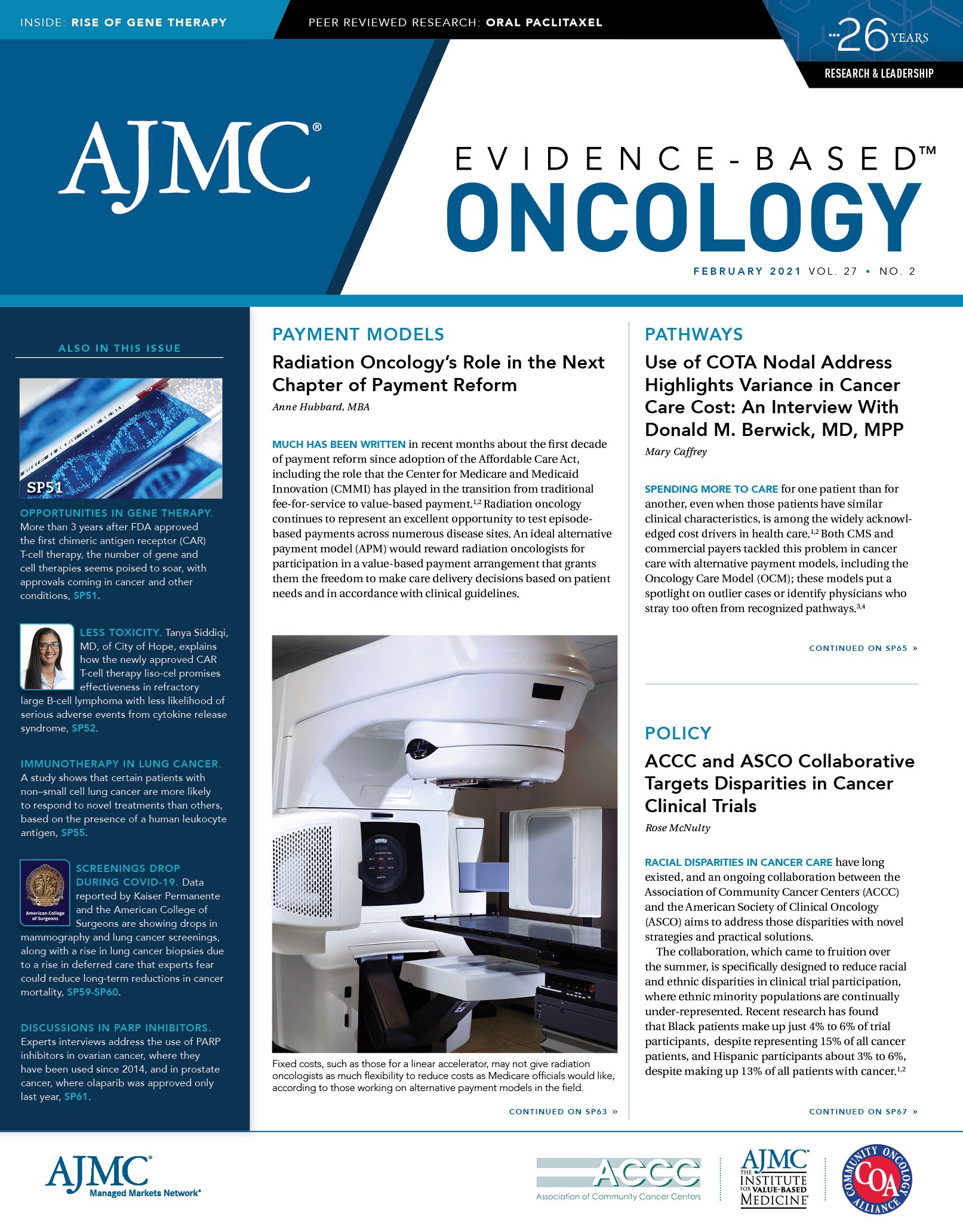- Center on Health Equity & Access
- Clinical
- Health Care Cost
- Health Care Delivery
- Insurance
- Policy
- Technology
- Value-Based Care
FDA Grants Tiragolumab Breakthrough Therapy Designation for PD-L1–High NSCLC
Genentech's tiragolumab, a novel immunotherapy for non-small cell lung cancer with PD-L1 expression, is the first anti-TIGIT therapy to be granted Breakthrough Therapy Designation.
Genentech announced that tiragolumab, a novel anti-TIGIT immunotherapy, was granted breakthrough therapy designation (BTD) by the FDA for use in combination with atezolizumab (Tecentriq) in the first-line treatment of metastatic non-small cell lung cancer (NSCLC) patients whose tumors have high levels of programmed-death ligand-1 (PD-L1) and do not have EGFR or anaplastic lymphoma kinase (ALK) mutations.1
Tiragolumab is the first anti-TIGIT therapy to be granted BTD by the FDA. The designation was based on data from the phase 2 CITYSCAPE trial that was first presented at the 2020 American Society of Clinical Oncology (ASCO) Virtual Scientific Program in May. TIGIT is an immune checkpoint protein that is expressed on multiple immune cells, including T cells.
The double-blind, placebo-controlled trial included 135 chemotherapy-naïve, PD-L1–positive (tumor proportion score [TPS] ≥ 1% determined by 22C3 IHC pharmDx Dako assay) NSCLC patients with locally advanced or metastatic disease and no EGFR or ALK mutations.2 Primary end points are overall response rate (ORR) and median progression-free survival (PFS).
Patients were randomized to receive either tiragolumab plus atezolizumab (n = 67) or atezolizumab plus a placebo (n = 68), and an initial analysis with median follow-up of 5.9 months found that the tiragolumab cohort had a better ORR and longer median PFS compared with the placebo group. Treatment-related adverse events (TRAEs) occurred in 72% of the placebo group and 80.6% of the tiragolumab cohort. The full results presented at ASCO provided an additional 6 months of follow-up, with a median follow-up of 10.9 months as of December 2, 2020.
ORR and median PFS remained improved in the tiragolumab cohort compared with the placebo group. Tiragolumab-treated patients saw a 37.3% ORR and 5.6-month median PFS versus 20.6% and 3.9 months in patients on the atezolizumab and placebo regimen. In an exploratory analysis, people whose tumors expressed high levels of PD-L1 (TPS ≥ 50%) showed a 66% ORR in the combination therapy group versus 24% with atezolizumab alone. The safety profile remained tolerable with the combination therapy.
The CITYSCAPE trial is the first randomized trial of an anti-TIGIT therapy and provides evidence that targeting both TIGIT and PD-L1 may improve anti-tumor activity by amplifying immune response. Biomarker analyses from the trial will be presented at the International Association for the Study of Lung Cancer 2020 World Conference, which is set for January 28-31, 2021.
“We have been researching TIGIT as a novel cancer immunotherapy target for almost 10 years and we are pleased that the FDA has acknowledged the potential of tiragolumab to substantially improve outcomes for people with certain types of lung cancer,” Levi Garraway, MD, PhD, chief medical officer and head of global product development at Genentech, said in a statement. “We look forward to advancing our tiragolumab development program, which includes chemotherapy-free combinations and trials in early stages of disease across multiple cancer types with high unmet need.”1
The tiragolumab development program aims to expand into earlier disease stages and new patient populations with unmet needs. There are ongoing randomized trials in metastatic NSCLC and small cell lung cancer; earlier disease stages such as stage III NSCLS and locally advanced esophageal cancer; and metastatic esophageal squamous cancer and cervical cancer.
References
1. Genentech’s novel anti-TIGIT tiragolumab granted FDA breakthrough therapy designation in combination with Tecentriq for PD-L1–high non-small cell lung cancer. News release. Genentech. January 5, 2021. Accessed January 5, 2021. https://www.gene.com/media/press-releases/14892/2021-01-04/genentechs-novel-anti-tigittiragolumab-
2. Rodriguez-Abreu D, Johnson ML, Hussein MA, et al. Primary analysis of a randomized, double-blind, phase II study of the anti-TIGIT antibody tiragolumab (tira) plus atezolizumab (atezo) versus placebo plus atezo as firstline (1L) treatment in patients with PD-L1-selected NSCLC (CITYSCAPE). J Clin Oncol. 2020;38(suppl 15):9503. doi:10.1200/JCO.2020.38.15_suppl.9503

